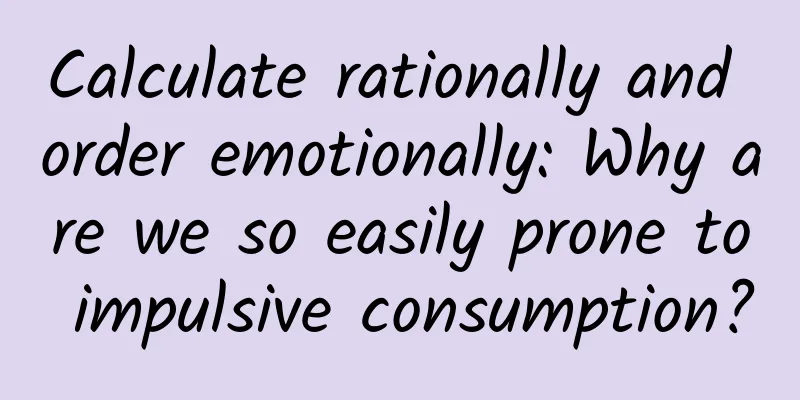Calculate rationally and order emotionally: Why are we so easily prone to impulsive consumption?

|
Cross-store discounts, instant discounts for deposits, team building, large-value coupons, VIP-exclusive red envelopes... It's another "Double Eleven" and all major platforms have started promotions. Who among the modern "late-nighters" doesn't spend the whole night calculating formulas for a few coupons? They won't blink at products worth hundreds of dollars and must not forget the discounts of a few cents. The main idea is to "save where you can and spend where you can"! It has to be said that in the digital age, the fast logistics system has made online shopping a part of our lives. The process from selection to ordering is an indescribable joy that makes people unable to stop. But often after a smooth operation, the storage room is filled with facial mask tissues and laundry detergents, and it will take years to use them up. But when you watch the live broadcast, you will rush to buy again... Why can't you stop buying once you start? Behind this irresistible impulse addiction to shopping, it is actually the brain's response mechanism that is at work. 1. Can’t control yourself when you see discounts? You are not alone! Shopping desire refers to the desire of an individual to buy goods, which is essentially one of the basic needs of human beings. As early as in ancient times, the division of labor between men hunting and women gathering shaped us today: the extremely unstable food source made our ancestors more inclined to meet immediate needs. Waiting for several days may not necessarily bring better rewards. Getting what you want on the spot is the real happiness. Research has found that when individuals face shopping impulses, the reward system in the brain is activated, releasing neurotransmitters such as dopamine, which controls our pleasure and satisfaction, and also controls most of our daily behaviors. If the secretion of dopamine is likened to a roller coaster track, when you start browsing shopping web pages and hear promotional advertisements, dopamine is secreted in large quantities, and the roller coaster starts; after you get enough discounts and place an order, and the flash sale is successful, dopamine secretion also reaches its peak. This reward feedback mechanism allows individuals to feel positive emotions and happiness when shopping, which in turn deepens their dependence on and desire for shopping. At the same time, this kind of happiness further strengthens the desire to shop. In the movie "Confessions of a Shopaholic", the heroine's life seems to be tied to shopping. Whenever she passes by a store window, a voice in her heart gives orders: You need it! Then, she will quickly rush into the store and buy all the cosmetics, skirts, coats, and scarves she likes. Moreover, online shopping provides a 24-hour uninterrupted shopping experience and a relatively more convenient and economical shopping method, which makes the excitement after placing an order doubled. Source: Tuchong Creative 2. If you buy something and then cut off your hands, you will find yourself like "Avalokitesvara": Beware of compulsive shopping disorder As mentioned above, dopamine brings us happiness and satisfaction, and individuals can easily get the pleasure of buying goods by simply clicking to place an order/swiping a card to pay. However, some people's reward system may be overactivated, causing them to have an overly strong desire to shop, and thus become what we commonly call "shopaholics". In the view of psychologists, such people are likely to suffer from "compulsive shopping disorder." More than 100 years ago, German psychologist Emmy Kraepelin proposed the concept of "shopping addiction". However, it was not until the 1990s that the field of mental health began to formally study this phenomenon and called it "compulsive shopping disorder". Psychologists define it as a mental illness, usually related to emotional problems such as anxiety and depression, and its main feature is persistent, excessive and uncontrollable shopping behavior. Some studies have also found that the desire to shop is closely related to an individual's emotional state. Shopping can relieve anxiety, stress and negative emotions, so it is easier to have the desire to shop when you are depressed. Patients have nowhere to vent their emotions in reality, and ultimately seek temporary emotional relief through shopping. However, this relief is only temporary. In the long run, crazy shopping will aggravate their emotional problems. It will lead to more serious problems such as financial crisis, loss of social interaction, and psychological depression. In addition, irrational purchases are also partly due to the need for self-identification or the consumer's competitive mentality. In an era of nationwide shopping sprees, many people will unconsciously refer to the "unboxing" and "order sharing" of people around them or on social media, resulting in an uncontrollable desire to buy. In recent years, some middle-aged and elderly shoppers have also joined the "shopping party" and can't stop watching short videos and live broadcasts. They believe everything the anchor says. This dependence and desire for live shopping may also show the characteristics of shopping addiction to a certain extent, but it is not necessarily an absolute pathology. It is more influenced by commercial marketing and psychological guidance. If this behavior leads to financial problems or affects normal life, then you need to be alert to the possibility of shopping addiction. Source: Tuchong Creative 3. Why do things that you have to buy no longer attract you once you get them? How to break the "vicious cycle" Let's go back to the dopamine roller coaster. When the shopping process is over, the roller coaster drops from the high point, which means that the secretion of dopamine gradually decreases and our neural excitement continues to decline. This is actually because the practice of seeking happiness through shopping is only a temporary relief solution, and it cannot really solve our inner emptiness and dissatisfaction. In Confessions of a Shopaholic, the heroine's shopping spree ended with all 12 credit cards maxed out, and the debt collector made her lie public. When her boyfriend asked her how she explained it, she said, "Because when I was shopping, the world became a better place; then it became worse, so I went shopping again." Normal shopping behavior can indeed help us relieve stress and gain happiness. However, when we find that frequent shopping behavior begins to affect our normal life and family happiness, we need to be vigilant and make timely adjustments. Here are some suggestions to help you break the vicious cycle of shopping addiction: 01 Self-awareness: We need to be clear about our shopping behavior and observe whether it has brought negative effects. This requires us to be honest with ourselves and pay more attention to the voices of our relatives and friends. 02 Emotional management: When we feel anxious, stressed or depressed, we need to find healthier ways to deal with these emotions, such as exercise, meditation, conversation, etc., rather than escaping through shopping. 03 Set a budget: Live within your means, set a reasonable shopping budget, and avoid overspending. When you ask yourself what kind of products you really need, the impulse to buy will stop. 04 Explore hobbies: Find things that truly make us feel satisfied and happy, such as spending time with family and friends, self-improvement, hobbies, etc. These things can bring us a deeper sense of satisfaction. 05 Seek help: If we find that we cannot control our shopping behavior, we need to seek professional help, such as psychological counseling, group therapy, etc. The desire to shop is not a terrible thing, but only when we learn to think rationally and consume rationally can we truly "free" ourselves from the desire to shop, find true happiness and satisfaction, and gain inner peace and abundance. author: Tang Yicheng, China Science Popularization Expert, Secretary General of the Science Popularization Committee of the Chinese Psychological Society Wang Xiang Chief Writer, Beijing China Science Popularization Center for Mental Health Promotion Reviewer: Fan Chunlei, Associate Researcher, Institute of Psychology, Chinese Academy of Sciences Produced by: Science Popularization China Produced by: China Science and Technology Press Co., Ltd., China Science and Technology Publishing House (Beijing) Digital Media Co., Ltd. |
<<: Fever myths: How high a fever can damage the brain? The truth is…
>>: Why am I still so cold even though I wear so many clothes in winter?
Recommend
Musk's "Starship" launch failed, but the engine "Raptor" is still epoch-making
On April 20, 2023, the "Starship" super...
iOS 11 updates the sixth developer beta, and the biggest change is the App Store logo
If you are used to the Apple App Store logo - a t...
A must-have user growth map for new product developers
User growth is an eternal topic in the Internet c...
How to use data to improve customer acquisition and sales conversion
Combined with business scenarios, we teach you ho...
How to master oCPC and efficiently complete customer acquisition and conversion?
Mobile Internet access, mobile payment, online sh...
Can short video operations be both eye-catching and easy to monetize?
Wearing traditional ethnic costumes, seven native...
The conversion rate of products in Douyin live broadcast room is low, how to improve it? 4 key secrets to explosive sales!
Nowadays, it is not uncommon to see news about to...
How to become an excellent anchor's questions and confusions? The answers are all here
Take away the secrets of monthly sales of tens of...
How to design an e-commerce new product channel?
Nowadays, with the rapid development of the Inter...
The past and present of the "Angel Pill" Aspirin
Bayer is a global pharmaceutical company. The inf...
Adobe: 2020 Web Customer Experience Trends Report
Adobe released the "2020 Web Customer Experi...
It’s time to enjoy the spring, but don’t get angry!
As the weather gradually warms up, it is a good t...
Community operation: operation skills of community content!
Content is the prerequisite for the development o...
On World Telecommunication Day, let’s talk about why the disruptive technology quantum communication can achieve “absolute confidentiality”
Today is the 55th World Telecommunication Day. In...
Take you to play with Douyin's local traffic pool
Course Description The opportunities for Douyin i...









